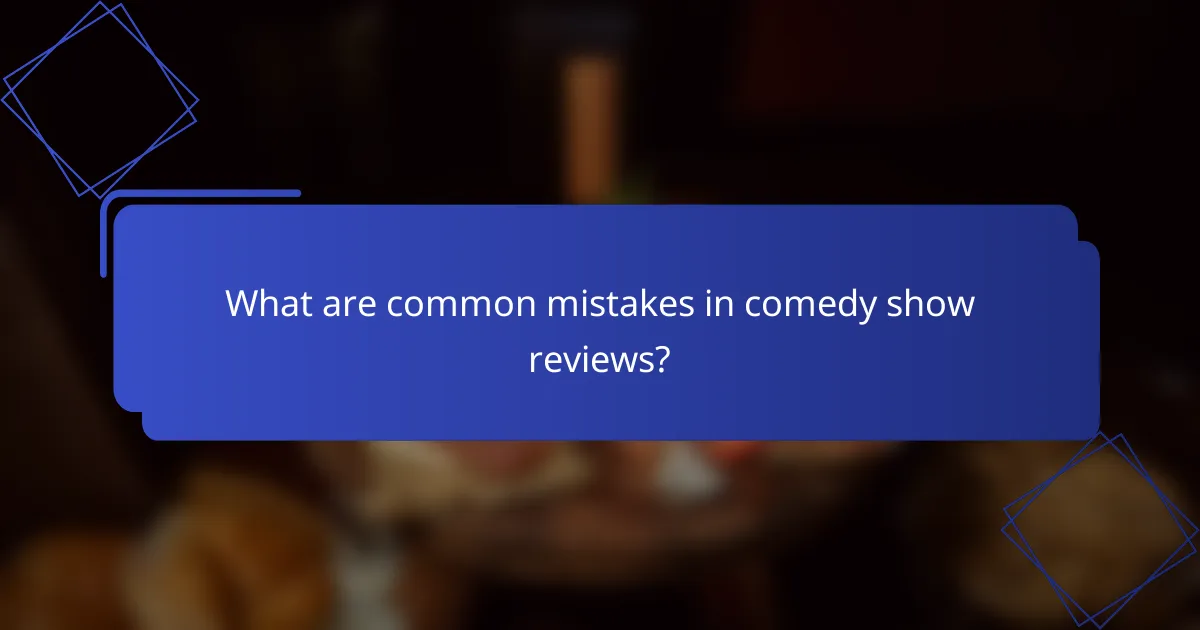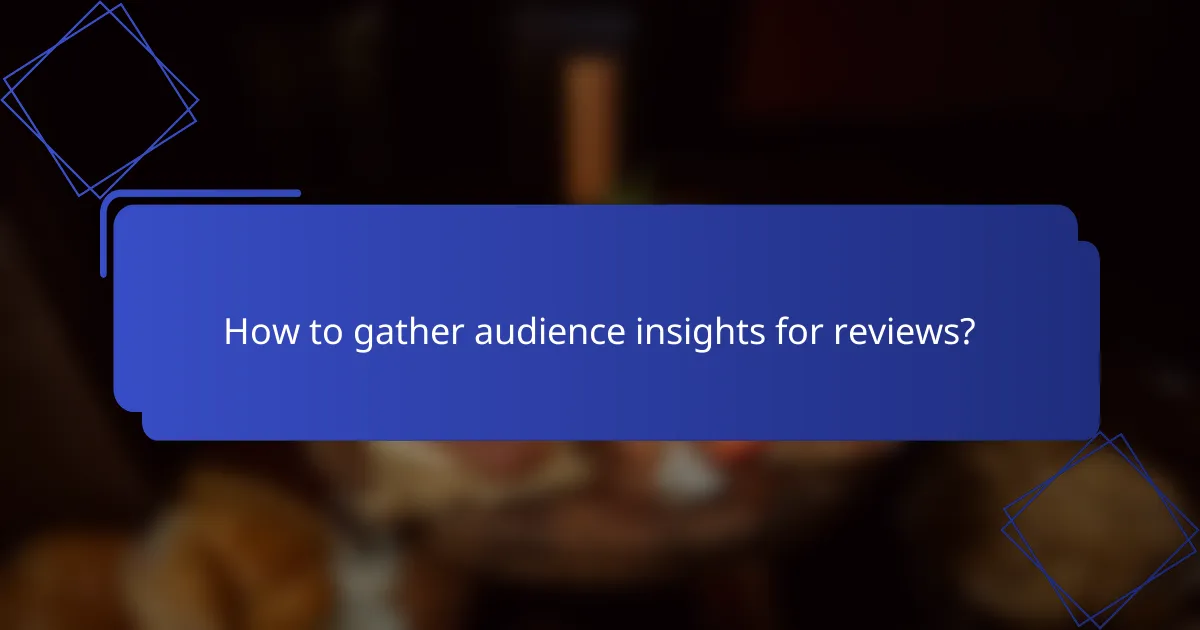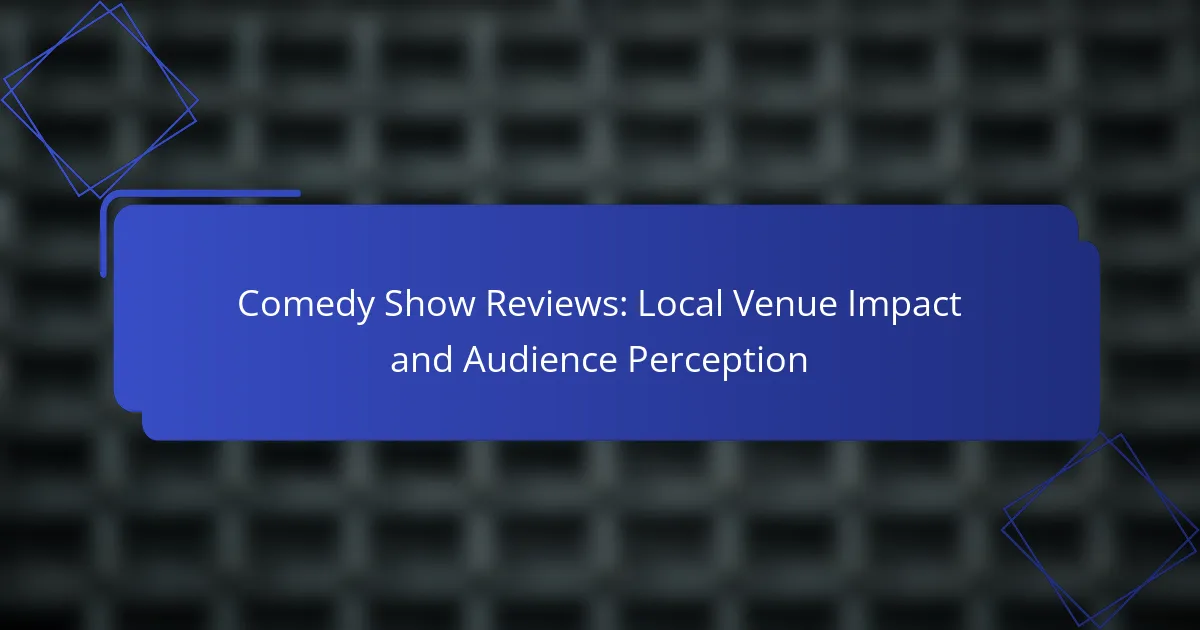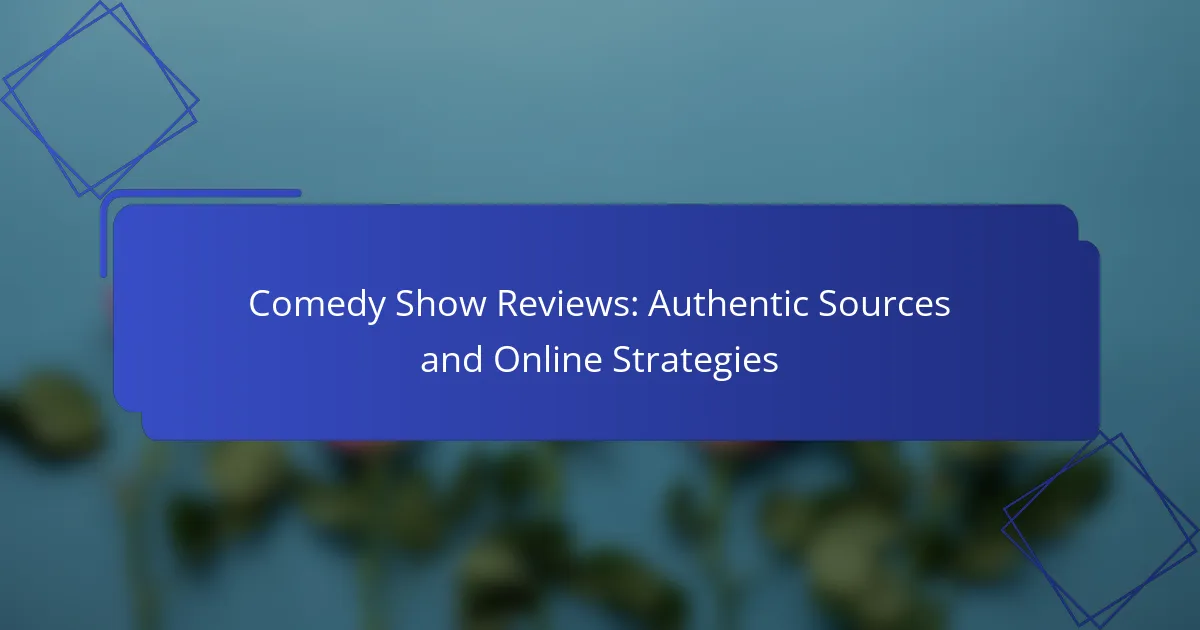Writing effective comedy show reviews requires a keen analysis of humor techniques, audience engagement, and the delivery of performances. A well-crafted review not only highlights the strengths and weaknesses of a show but also provides constructive feedback that enhances the appreciation of comedy as an art form.

How to write effective comedy show reviews?
Writing effective comedy show reviews involves analyzing humor techniques, audience engagement, and performance delivery while incorporating personal reactions. A well-rounded review provides constructive criticism that can help both performers and audiences appreciate the art of comedy.
Focus on humor techniques
When reviewing a comedy show, pay close attention to the humor techniques used by the performers. This includes examining the types of jokes, timing, and delivery methods such as observational humor, wordplay, or physical comedy. Identifying these techniques helps readers understand what made the performance effective or lacking.
Consider how the humor resonates with the audience. For instance, jokes that rely on cultural references may work well in one locale but fall flat in another. Highlighting these nuances can enhance your review’s relevance.
Evaluate audience engagement
Audience engagement is crucial in comedy, as it reflects how well the material connects with viewers. Observe the crowd’s reactions—laughter, applause, or even silence can indicate the effectiveness of the performance. Note specific moments that elicited strong responses, as these details enrich your review.
Additionally, consider the demographics of the audience. Different age groups or cultural backgrounds may influence how jokes are received. Mentioning these factors can provide context for your evaluation.
Assess performance delivery
The delivery of a comedy performance can significantly impact its success. Evaluate the comedian’s timing, pacing, and stage presence. A performer who masters these elements can elevate even simple jokes into memorable moments.
Look for variations in delivery styles, such as improvisation versus scripted material. Highlighting these differences can give readers insight into the comedian’s skill set and versatility.
Include personal reactions
Your personal reactions to the show can add depth to the review. Share your emotional responses to specific jokes or segments, as this helps readers connect with your perspective. Authenticity in your reactions can make the review more relatable and engaging.
However, balance your personal views with objective analysis. While your feelings matter, they should complement rather than overshadow the overall evaluation of the performance.
Provide constructive criticism
Constructive criticism is essential for helping comedians improve. When pointing out areas for growth, be specific and offer actionable suggestions. For example, if a joke fell flat, explain why and suggest alternative approaches.
Maintain a respectful tone, as comedy is subjective. Focus on the performance rather than the performer, and aim to provide feedback that encourages growth and development in their craft.

What are key elements of a comedy show review?
A comedy show review should capture the essence of the performance, highlighting its strengths and weaknesses. Key elements include a summary of the show, standout moments, the comedian’s style, and the audience’s response.
Show summary
The show summary provides an overview of the performance, including the comedian’s name, the venue, and the date. It should outline the general theme or premise of the show, giving readers a sense of what to expect.
For example, if the comedian focuses on observational humor about everyday life, mention that aspect to set the stage for the review. Keep the summary concise, ideally within a few sentences.
Highlight standout moments
Highlighting standout moments involves identifying the jokes or segments that particularly resonated with the audience. These could be punchlines that elicited strong laughter or unique storytelling elements that captivated viewers.
Consider including specific examples, such as a clever twist on a common scenario or an unexpected punchline that left a lasting impression. This helps readers understand what made the show memorable.
Discuss comedian’s style
Discussing the comedian’s style involves analyzing their delivery, timing, and overall approach to humor. Is their style more anecdotal, satirical, or absurd? Understanding this helps contextualize their performance.
For instance, a comedian who relies heavily on improvisation may create a different atmosphere compared to one who sticks to a scripted routine. Mentioning these nuances can enrich the review and provide deeper insights.
Analyze audience response
Analyzing audience response is crucial for gauging the show’s impact. Pay attention to the overall energy in the room, including laughter, applause, and audience engagement. This can indicate how well the material resonated with the crowd.
Consider noting the demographics of the audience, as different groups may react differently to various styles of humor. For example, a younger crowd might respond more enthusiastically to pop culture references than an older audience.

What are common mistakes in comedy show reviews?
Common mistakes in comedy show reviews include overly negative tones, a lack of specific examples, and ignoring the context of humor. These pitfalls can distort the review’s effectiveness and misrepresent the show’s quality.
Overly negative tone
An overly negative tone can alienate readers and overshadow the positive aspects of a comedy show. While it’s important to critique performances, focusing solely on flaws can lead to an unbalanced review.
To avoid this, aim for a balanced perspective that highlights both strengths and weaknesses. For instance, if a joke fell flat, consider mentioning the successful bits that preceded it to provide a fuller picture.
Lack of specific examples
Failing to provide specific examples weakens a review’s credibility. Readers benefit from concrete references to jokes, sketches, or performances that illustrate your points.
When discussing a comedian’s style, quote a memorable line or describe a particular moment that resonated with the audience. This not only enhances your review but also helps readers understand the humor better.
Ignoring the context of humor
Ignoring the context of humor can lead to misinterpretations of a comedian’s intent or style. Comedy often relies on cultural references, timing, and audience engagement, which can vary widely.
Consider the venue, the audience demographics, and current events that may influence the humor. For example, a joke that works in a small, intimate club may not translate well to a larger theater setting. Acknowledging these factors provides a richer understanding of the performance.

How to gather audience insights for reviews?
Gathering audience insights for comedy show reviews involves collecting feedback directly from attendees to understand their experiences and preferences. This information can enhance the quality of your reviews and provide valuable context for potential viewers.
Conduct surveys post-show
Surveys are a direct way to gather audience insights immediately after the show. Distributing short questionnaires can help capture attendees’ reactions while their experiences are fresh. Aim for 5-10 questions focusing on aspects like humor quality, pacing, and overall satisfaction.
Consider using a mix of multiple-choice and open-ended questions to gather both quantitative and qualitative data. For instance, ask attendees to rate their enjoyment on a scale of 1-10 and provide space for comments on what they liked or disliked.
Engage with social media feedback
Social media platforms are rich sources of audience insights. After the show, monitor hashtags, comments, and posts related to the performance to gauge public sentiment. Look for recurring themes in the feedback, such as favorite jokes or criticisms about pacing.
Engaging with your audience on these platforms can also encourage more interaction. Respond to comments and ask follow-up questions to deepen your understanding of their experiences. This can help build a community around your reviews.
Attend multiple performances
Attending multiple performances of the same show allows you to observe variations in audience reactions and performer delivery. This approach can highlight what works well and what may need improvement, providing a more rounded perspective for your reviews.
Take notes on audience reactions during different segments of the show, noting any shifts in energy or laughter levels. This can help you identify which parts resonate most with viewers and inform your analysis in future reviews.

What are the best platforms for publishing comedy reviews?
The best platforms for publishing comedy reviews include dedicated entertainment websites, social media channels, and personal blogs. Each platform offers unique advantages for reaching different audiences and enhancing visibility.
Entertainment Websites
Entertainment websites like Rotten Tomatoes and IMDb are popular for publishing comedy reviews. These platforms attract a large audience looking for curated content, making them ideal for gaining exposure. However, competition is fierce, and reviews may get lost among many others.
Social Media Channels
Social media platforms such as Twitter, Instagram, and Facebook are effective for sharing comedy reviews with a broad audience. They allow for quick interactions and real-time feedback, which can enhance engagement. Consider using hashtags and tagging comedians or shows to increase visibility.
Personal Blogs
Starting a personal blog provides complete control over content and style. Platforms like WordPress or Medium allow for customization and can cater to niche audiences interested in specific comedy genres. However, building an audience takes time and consistent effort in promoting your blog.



